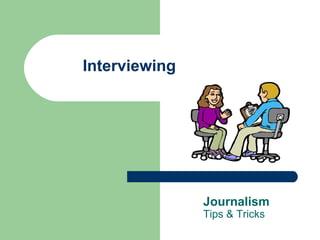Journalism: Interviewing tips
- 2. Interviewing ’ü¼ So much of what journalist do is about talking to the right people ’ü¼ Most stories will require you to interview at least one person
- 3. Interviewing ’ü¼ Other peoples stories help give a range of perspectives ’ü¼ A compelling story is often about other peoples experiences
- 4. Interviewing ’ü¼ Finding the right source can often be the hardest part of telling a story ’ü¼ You also need to be able to ask the right questions
- 5. Interviewing ’ü¼ If your goal is to get accurate and interesting information for your story ’ü¼ There are several strategies available to get your subject to talk
- 6. Before the Interview ’ü¼ You might need to do some preparation for the interview ’ü¼ What do you already know about the person or the subject you want to talk about ’ü¼ What else can you find out about the person or the subject before the interview
- 7. Before the Interview ’ü¼ You need to become a mini-expert ’ü¼ Don't expect the person you are interviewing to do all the work for you ’ü¼ You need to know as much as possible before you decide what questions to ask
- 9. During the Interview ’ü¼ Make the person you are interviewing feel comfortable ’ü¼ A source will give you better answers if they feel comfortable ’ü¼ Be relaxed and conversational about your questions
- 11. During the Interview ’ü¼ Ask open-ended questions ’ü¼ Avoid questions with yes or no answers ’ü¼ Be prepared to ask follow-up questions
- 13. Open ŌĆō vs ŌĆō Closed Questions ’ü¼ Closed ŌĆō ŌĆō Do you get on with your classmates? What colour shirt are you wearing? ’ü¼ Open ŌĆō ŌĆō Will you tell me about how you get on with your classmates Why are you wearing a red shirt?
- 15. During the Interview ’ü¼ Ask about experiences ’ü¼ Ask about anecdotes ’ü¼ Try and get some quotes you can use in your story ’ü¼ Remember to ask questions that your readers might want to ask
- 16. During the Interview ’ü¼ Avoid giving your own opinions about a topic ’ü¼ Direct your source towards the topics you want to discuss ’ü¼ Remember to use follow-up questions to go deeper into the story
- 17. During the Interview ’ü¼ Take notes while you are doing the interview ’ü¼ Try recording the interview as well ’ü¼ You will find it easier to understand your notes after the interview if you have already recorded it
- 19. Ending the Interview ’ü¼ End the interview by asking the source if there is anything they would like to add ’ü¼ This is not only polite but shows the source you care about what they have to say
- 21. After the Interview ’ü¼ Transfer your note to computer as soon as possible afterwards ’ü¼ Do some writing while the interview is still fresh in your mind
- 23. After the Interview ’ü¼ Think about your headline ’ü¼ Think about your lead paragraph ’ü¼ What will be the heart of your story
- 24. After the Interview ’ü¼ Remember the pyramid i.e. the most important information comes first ’ü¼ Try ranking the 5W's and 1H in order of importance
- 27. Brainstorm Your Questions ’ü¼ Make a list of open-ended questions to ask another classmate ’ü¼ What kind of questions might illicit a story from them that you can then write about
- 29. Interview a classmate ’ü¼ Now conduct an interview with a classmate
- 30. Write up your article ’ü¼ Now write up the interview including a headline and lead paragraph
- 31. Read out your article ’ü¼ Now read out your article headline and lead paragraph to the class
- 32. Thanks to... ’ü¼ ’ü¼ ’ü¼ ’ü¼ The contents of this slide deck was adapted from http://www.schooljournalism.org/interviewing-tips/ Images taken from the interweb And some of my own ideas were utilised in the making of this slide deck as well Feel free to adapt, edit and rewrite as you need
































